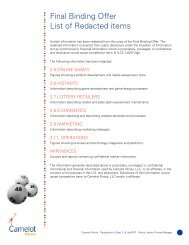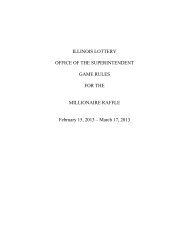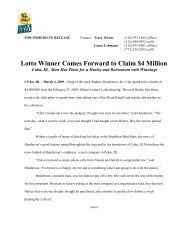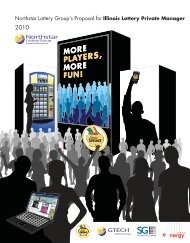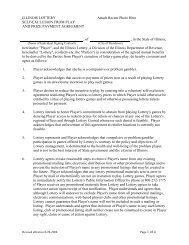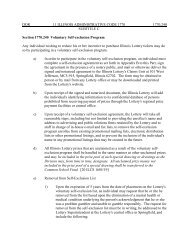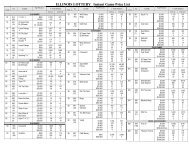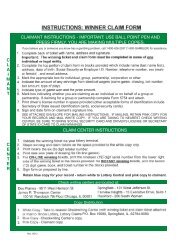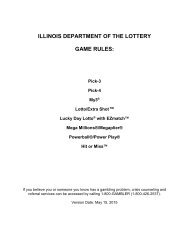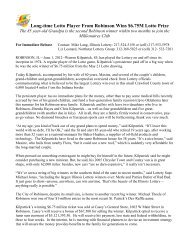Illinois Lottery Retailer Application Packet
Illinois Lottery Retailer Application Packet
Illinois Lottery Retailer Application Packet
Create successful ePaper yourself
Turn your PDF publications into a flip-book with our unique Google optimized e-Paper software.
Instructions for Completing W-9 Form3. Real estate transactions. You must sign the certification. You maycross out item 2 of the certification.4. Other payments. You must give your correct TIN, but you do nothave to sign the certification unless you have been notified that youhave previously given an incorrect TIN. “Other payments” includepayments made in the course of the requester’s trade or business forrents, royalties, goods (other than bills for merchandise), medical andhealth care services (including payments to corporations), paymentsto a nonemployee for services, payments to certain fishing boatcrew members and fishermen, and gross proceeds paid to attorneys(including payments to corporations).5. Mortgage interest paid by you, acquisition or abandonment ofsecured property, cancellation of debt, qualified tuition programpayments (under section 529), IRA, Coverdell ESA, Archer MSA orHSA contributions or distributions, and pension distributions. Youmust give your correct TIN, but you do not have to sign thecertification.What Name and Number to Give the RequesterFor this type of account:Give name and SSN of:1. Individual2. Two or more individuals(joint account)3. Custodian account of a minor(Uniform Gift to Minors Act)4. a. The usual revocable savings trust(grantor is also trustee)b. So-called trust account that is nota legal or valid trust under state law5. Sole proprietorship or disregardedentity owned by an individual6. Grantor trust filing under OptionalForm 1099 Filing Method 1 (seeRegulation section 1.671-4(b)(2)(i)(A))For this type of account:7. Disregarded entity not owned byan individual8. A valid trust, estate, or pension trust9. Corporation or LLC electingcorporate status on Form 8832 orForm 255310. Association, club, religious,charitable, educational, or othertax-exempt organization11. Partnership or multi-member LLC12. A broker or registered nominee13. Account with the Department ofAgriculture in the name of a publicentity (such as a state or localgovernment, school district, or prison)that receives agricultural programpayments.14. Grantor trust filing under the Form1041 Filing Method or the OptionalForm 1099 Filing Method 2 (seeRegulation section 1.671-4(b)(2)(i)(B))The individualThe actual owner of the accountor, if combined funds, the firstindividual on the account 1The minor 2The grantor-trustee 1The actual owner 1The owner 3The grantor*Give name and EIN of:The ownerLegal entity 4The corporationThe organizationThe partnershipThe broker or nomineeThe public entityThe trust1List first and circle the name of the person whose number you furnish. If only oneperson on a joint account has an SSN, that person’s number must be furnished.2Circle the minor’s name and furnish the minor’s SSN.3You must show your individual name and you may also enter your business or “DBA”name on the “Business name/disregarded entity” name line. You may use either yourSSN or EIN (if you have one), but the IRS encourages you to use your SSN.4List first and circle the name of the trust, estate, or pension trust. (Do not furnish the TINof the personal representative or trustee unless the legal entity itself is not designated inthe account title.) Also see Special rules for partnerships on page 1.*Note. Grantor also must provide a Form W-9 to trustee of trust.Note. If no name is circled when more than one name is listed, thenumber will be considered to be that of the first name listed.Secure Your Tax Records from Identity TheftIdentity theft occurs when someone uses your personal informationsuch as your name, social security number (SSN), or other identifyinginformation, without your permission, to commit fraud or other crimes.An identity thief may use your SSN to get a job or may file a tax returnusing your SSN to receive a refund.To reduce your risk:> > Protect your SSN,> > Ensure your employer is protecting your SSN, and> > Be careful when choosing a tax preparer.If your tax records are affected by identity theft and you receivea notice from the IRS, respond right away to the name and phonenumber printed on the IRS notice or letter.If your tax records are not currently affected by identity theftbut you think you are at risk due to a lost or stolen purse or wallet,questionable credit card activity or credit report, contact the IRSIdentity Theft Hotline at 1-800-908-4490 or submit Form 14039.For more information, see Publication 4535, IdentityTheft Prevention and Victim Assistance.Victims of identity theft who are experiencing economic harm ora system problem, or are seeking help in resolving tax problems thathave not been resolved through normal channels, may be eligible forTaxpayer Advocate Service (TAS) assistance. You can reach TAS bycalling the TAS toll-free case intake line at 1-877-777-4778 or TTY/TDD1-800-829-4059.Protect yourself from suspicious emails or phishing schemes.Phishing is the creation and use of email and websites designed tomimic legitimate business emails and websites. The most commonact is sending an email to a user falsely claiming to be an establishedlegitimate enterprise in an attempt to scam the user into surrenderingprivate information that will be used for identity theft.The IRS does not initiate contacts with taxpayers via emails.Also, the IRS does not request personal detailed information throughemail or ask taxpayers for the PIN numbers, passwords, or similarsecret access information for their credit card, bank, or other financialaccounts.If you receive an unsolicited email claiming to be from the IRS,forward this message to phishing@irs.gov. You may also report misuseof the IRS name, logo, or other IRS property to the Treasury InspectorGeneral for Tax Administration at1-800-366-4484. You can forward suspicious emails to theFederal Trade Commission at: spam@uce.gov or contact them atwww.ftc.gov/idtheft or 1-877-IDTHEFT (1-877-438-4338).Visit IRS.gov to learn more about identity theft and how to reduceyour risk.Privacy Act NoticeSection 6109 of the Internal Revenue Code requires you to provide your correct TIN topersons (including federal agencies) who are required to file information returns with theIRS to report interest, dividends, or certain other income paid to you; mortgage interestyou paid; the acquisition or abandonment of secured property; the cancellation of debt;or contributions you made to an IRA, Archer MSA, or HSA. The person collecting thisform uses the information on the form to file information returns with the IRS, reportingthe above information. Routine uses of this information include giving it to the Departmentof Justice for civil and criminal litigation and to cities, states, the District of Columbia,and U.S. possessions for use in administering their laws. The information also may bedisclosed to other countries under a treaty, to federal and state agencies to enforce civiland criminal laws, or to federal law enforcement and intelligence agencies to combatterrorism. You must provide your TIN whether or not you are required to file a tax return.Under section 3406, payers must generally withhold a percentage of taxable interest,dividend, and certain other payments to a payee who does not give a TIN to the payer.Certain penalties may also apply for providing false or fraudulent information.Instructions for Completing W-9 Form (R 07-2013) Page 4




